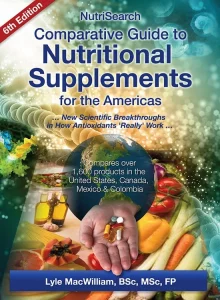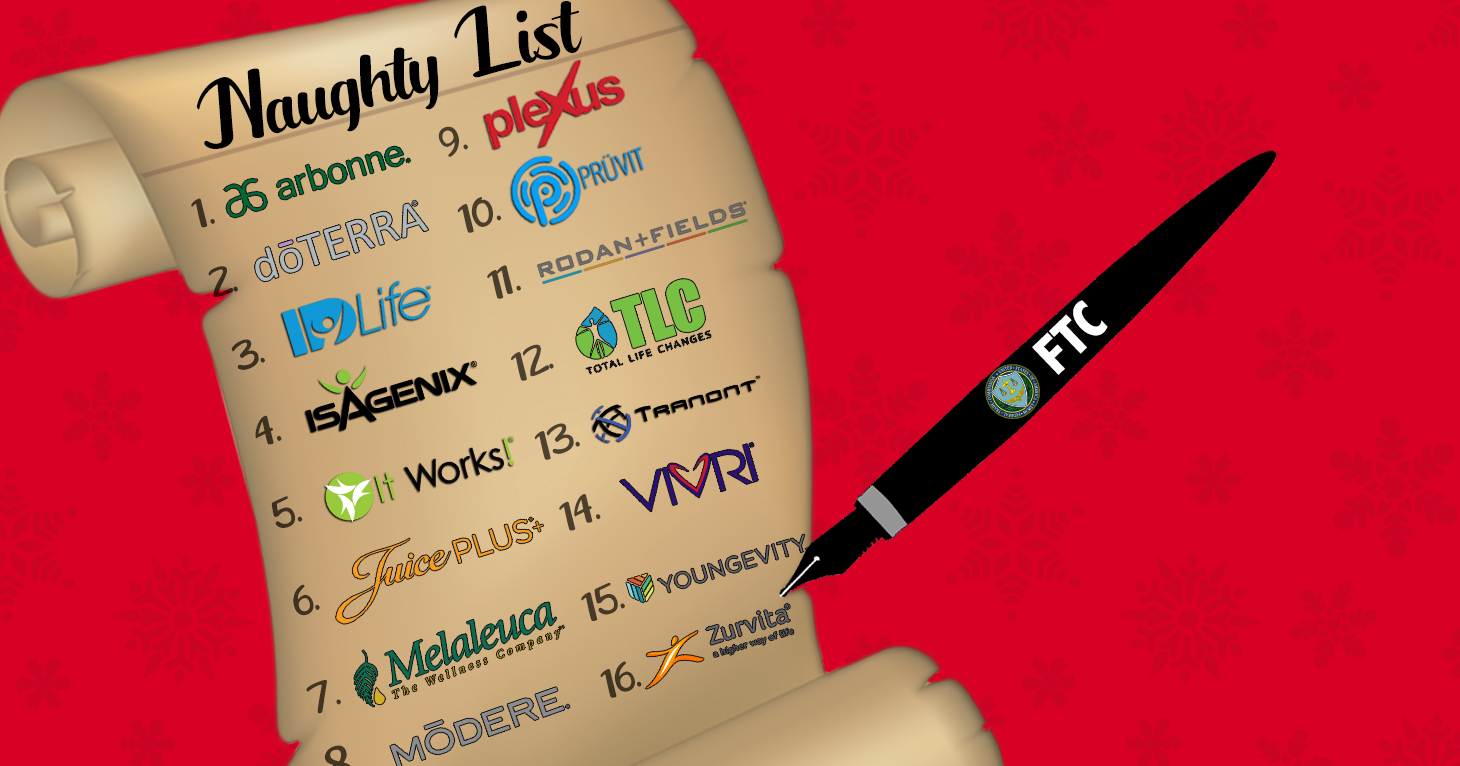
The Cost of Doing Business
Comparing the amount companies agree to pay to settle deceptive marketing charges with their annual revenue.
Supplement MLM takes down dozens of deceptive claims following TINA.org investigation.
Utah-based supplement Multilevel Marketing – a way of distributing products or services in which the distributors earn income from their own retail sales and from retail sales made by their direct and indirect recruits. USANA (aka USANA Health Sciences) operates in over 20 countries around the world. But only in the United States, at the entrance to the company’s headquarters in Salt Lake City, can you find the Million Dollar Club Walk of Fame. Unveiled in 2008, the Walk of Fame honors USANA distributors who have earned at least $1 million in commissions and bonuses.
But the reality is you’re much more likely to make no money or lose money than earn a million dollars as a USANA distributor. In fact, the MLM admits in its 2020 income disclosure statement that one out of three USANA distributors lose money, while a small fraction of 1 percent of distributors make six figures. However, this has not stopped the MLM and its distributors from marketing the business opportunity as a way to make career-level income, according to an ongoing TINA.org investigation.
Last week, TINA.org sent USANA a letter alerting the company to its latest findings, which, in addition to deceptive earnings claims, also include illegal disease-treatment claims made by the MLM and its distributors and undisclosed influencer marketing posts by USANA-sponsored athletes. In response, the company took prompt action to remove a number of problematic marketing examples identified by TINA.org and stated in a letter to TINA.org that it is “dedicated to ensuring that it does not engage in misleading advertising regarding its product and business opportunity.” TINA.org will continue to monitor the company’s progress.
This is not the first time TINA.org has called out USANA’s deceptive marketing practices. Here’s that history and what else you should know about USANA (click to expand each section).
The letter TINA.org sent USANA last week marked the third time in the last five years that TINA.org has reached out to the company regarding its deceptive marketing issues. TINA.org first put the company on notice in 2016 as part of an industrywide investigation into Direct Selling Association (DSA) member companies that found 97 percent of members, including USANA, had made or were making claims that their products can treat, cure, prevent, alleviate the symptoms of, or reduce the risk of developing diseases and disorders, in violation of the law. A year later, TINA.org found roughly the same percentage of DSA member companies had made or were making false and unsubstantiated income claims to promote the business opportunity, among them USANA. While the vast majority of USANA claims cited by TINA.org in 2016 and 2017 were taken down, the company and its distributors have continued to make illegal health and earnings claims.
In addition, in June 2021, TINA.org provided USANA with a copy of a letter it sent to the FTC urging the agency to implement a penalty offense program to help put an end to the game of whack-a-mole in the direct selling industry as a whole. Four months later, the FTC provided USANA, among others, with a formal notice regarding penalty offenses pertaining to deceptive income claims, as well as the use of endorsements that don’t properly disclose material connections to brands. The FTC noted that each violation could result in a $43,792 penalty.
In 2019, after TINA.org twice notified the company that it was using deceptive marketing tactics, USANA was recognized by the Direct Selling Association for a decade of promoting ethical business standards. In a press release, USANA noted that:
[T]he initiative recognizes member companies that go above and beyond in their effort to promote awareness of the code by fulfilling the necessary criteria and adhering to ethical business practices within direct sales. The initiative encourages companies to be truthful about their products, services, identity and privacy. It seeks to eliminate deceptive or unlawful consumer or recruiting practices and creates an environment of ethical business practices.
In fact, USANA’s own marketing practices have often violated the DSA’s Code of Ethics, which prohibits members from making misleading claims.
USANA says its binary compensation plan* “eliminates many of the pitfalls that plague traditional direct-selling plans.” The MLM says its comp plan is different because it allows distributors to roll over “extra” sales volume into the next commission period. But there’s another way to look at it, which is that distributors aren’t getting paid for all of their sales and the sales of those in their downline.
What does USANA mean by “extra” sales volume, you ask? Under the binary structure of the comp plan, there are two sides to what USANA refers to as a distributor’s “business center,” a left side and a right side. Commissions are paid out when the sales volume on the left side is the same as the sales volume on the right side and both sides have at least 125 points in sales volume (more on how these points translate into actual dollars to come). When the sales volumes aren’t the same, the difference – or the “extra” sales volume – is rolled over.
In the examples that USANA gives in its comp plan, the left side sales volume either matches or is close to matching the right side sales volume, which seems convenient. Because at the same time USANA is touting its rollover feature, it is advising recruits to take steps so that they don’t have to use it: “Continue to build both sides of your business evenly to take full advantage of the work of you and your team members.”
Also telling is a statement that USANA makes in the middle of its comp plan: “Confused? Keep reading. It’ll all make sense soon.” Many comp plans in the MLM industry are confusing but not many MLMs willfully admit it.
*USANA does not publish its comp plan on its website. TINA.org found the comp plan discussed above, which is dated “9/14” at the bottom of the document, as many consumers researching USANA might find it: by googling “USANA compensation plan.” However, in an effort to allow distributors to grow their business globally, USANA said in an SEC filing earlier this year that it seeks to integrate its comp plan “seamlessly across all markets where legally permissible.” And a comp plan for distributors in the Philippines that went into effect in July 2021 has the same binary compensation structure and rollover feature as the comp plan outlined above. In a request for comment for this article, TINA.org asked USANA to confirm that this comp plan is the current one for U.S. distributors.
USANA encourages distributors to start with three business centers. “The advantage of having three business centers is that you will build your team under two business centers, but get paid on three,” the MLM says in the comp plan. But that requires double the product purchases than if you were to just start with one business center.
To open one business center and begin earning commissions, distributors must generate 200 points in personal sales volume, which they can achieve by ordering any of five 200-point supplement packs, each costing $280, according to an associate price list. To begin with three business centers, distributors are required to generate 400 points in personal sales volume, which they can do by ordering a “deluxe” supplement pack costing $570.
After the first month, the focus turns to remaining active for commissions, which requires – you guessed it – additional product purchases. In order to stay qualified for commissions (and not risk losing all accumulated sales volume), distributors must order 100 points in personal sales volume every month. A 100-point supplement package costs $132.95, or almost $1,600 annually to remain active for commissions.
None of the product purchases outlined above are reflected in USANA’s recently posted 2020 income disclosure statement. According to the document, one-third of USANA distributors – 34 percent – earned “less than $0” in annual compensation in 2020, while 17.5 percent earned “$0 to $250.” In 2019, USANA distributors fared even worse, with 45.1 percent earning “less than $0” and 32 percent earning “$0 to $250.”
In past income disclosures, there was a line for distributors who earned “$0” in annual compensation (which is not the same as breaking even because USANA does not account for expenses). Now, in an apparent effort to make its percentages look better, USANA separates those who earn “less than $0” from those who earn “$0 to $250,” putting those who made nothing (i.e., lost money) on the same level as those who made up to $250 (before expenses).
Of note, the startup costs explained in the 2020 income disclosure are different than those detailed in the only U.S. comp plan readily available to consumers. “There are no required product purchases to be an Associate, but you must purchase a Welcome Kit for $9.95,” the document states, adding: “On average, Associates spent $34 per year on non-commissionable products.”
Despite the grim outlook from the income disclosure detailed in the previous section, USANA has touted its business opportunity as a way to earn everything from extra cash and additional income to a million dollars, according to marketing examples in TINA.org’s latest sampling. Its distributors, meanwhile, have claimed USANA provides multiple streams of income, time and financial freedom (see above), generous weekly commissions and the ability to switch careers and become a successful and lucrative business owner.
However, while this may be true for a select few, when discussing the earnings potential of its distributors, an MLM (and its distributors) may not advertise unusual earnings realized by only a small number of distributors without running afoul of the law.
After alerting USANA to several marketing examples that contained deceptive earnings claims, the MLM removed more than half of them (including those in the above post) and stated that it will continue to work toward the removal of all claims identified by TINA.org.
In addition to deceptive earnings claims, TINA.org collected dozens of illegal disease-treatment claims made by USANA, USANA-sponsored athletes and distributors as part of its 2021 investigation. These include claims that the company’s products can improve memory and focus, prevent COVID-19, treat prostate cancer, prevent degenerative diseases, reduce blood pressure and risk of cancer (see above) and eliminate the need for heart medications.
Upon receiving TINA.org’s letter, USANA also removed more than half of the false health claims cited by TINA.org, including those in the above post.
Undisclosed payments that USANA allegedly made to the author of a supplement comparison guide in exchange for a number one rating in the guide are currently at the center of a pending lawsuit against the guide, its author and USANA.
 According to the lawsuit, which was originally filed in 2017 by Ariix, a competing supplement maker whose products are also covered in the “NutriSearch Comparative Guide to Nutritional Supplements,” USANA secretly paid hundreds of thousands of dollars in speaking and promotion fees to the guide and its author, a former USANA sales rep and advisory board member, for the highest rating in the guide. And when it appeared its status as the highest-rated supplement company in the guide might have been at risk, USANA threatened to stop the payments, at which point NutriSearch bestowed USANA its own special designation as an “Editor’s Choice,” the lawsuit alleges. The lawsuit claims the guide’s author then leveraged the award to persuade USANA to pay for a summerlong working vacation with his wife. USANA chipped in $90,000, according to the lawsuit.
According to the lawsuit, which was originally filed in 2017 by Ariix, a competing supplement maker whose products are also covered in the “NutriSearch Comparative Guide to Nutritional Supplements,” USANA secretly paid hundreds of thousands of dollars in speaking and promotion fees to the guide and its author, a former USANA sales rep and advisory board member, for the highest rating in the guide. And when it appeared its status as the highest-rated supplement company in the guide might have been at risk, USANA threatened to stop the payments, at which point NutriSearch bestowed USANA its own special designation as an “Editor’s Choice,” the lawsuit alleges. The lawsuit claims the guide’s author then leveraged the award to persuade USANA to pay for a summerlong working vacation with his wife. USANA chipped in $90,000, according to the lawsuit.
Earlier this year, a court ruled that the information in the guide constituted commercial speech and that NutriSearch could be liable for false advertising. In a majority opinion, the court noted that the allegations go beyond a failure to disclose a financial interest – the guide was always meant to serve as marketing material for USANA:
A mere failure to disclose bias or financial interest would not necessarily make speech commercial. Here, though, we face allegations that the defendants conceived the Guide to juice sales of Usana products, actively misled the public about their supposed independence, and fiddled with their own ratings criteria to boost a favored company that lavishes them with hundreds of thousands of dollars in compensation. Put another way, it is more paid promotion than product review, according to the complaint.
In February 2020, the Food and Drug Administration of the Philippines issued a public health warning regarding two USANA supplements – EstroPro and Vita-Antioxidant – that it said weren’t authorized for sale in the country.
When promoting health products, it helps to have people who seem healthy. USANA has some of the healthiest-seeming people in the world promoting its products – Olympic athletes.
At the 2020 Summer Olympics, held this summer due to the pandemic, #TeamUSANA competed in 22 different sports, including swimming, wrestling, skateboarding and gymnastics, and claimed 100 medals, highlighted by 44 golds, according to the company.
“If USANA were a country, its sponsored athletes and partners would have taken home the most gold medals and placed second overall in the total medal count in between the United States and China,” USANA said in a press release.
But some members of #TeamUSANA aren’t earning any medals when it comes to adhering to FTC guidelines surrounding advertising disclosures in sponsored social media posts. Take the below Instagram post by Olympic wrestler Sarah Hildebrandt, who won a bronze medal at the Tokyo 2020 Olympic Games.
Nowhere in the photo or long caption does Hildebrandt disclose that she is a USANA-sponsored athlete as required by FTC law. The idea being that her tens of thousands of followers may look differently on her endorsement of the company’s WholeBio bars if they knew there was a sponsorship deal behind it. (Following TINA.org’s letter, the post was taken down.)
But an advertising disclosure is no good if the majority of consumers don’t see it. Which is why the FTC also requires that disclosures be both clear and conspicuous. Placing #ad at the end of a long caption, as another USANA-sponsored athlete, Canadian sailor Sarah Douglas, does in the below post, is unlikely to impress the FTC.
(Following TINA.org’s letter, the above post was edited to include #ad at the beginning of the caption and the post now uses Instagram’s built-in disclosure tool to reveal it is part of a paid partnership with USANA, though the FTC has stated that such built-in disclosures on their own are not necessarily sufficient.)
A sure-fire way of getting on the FTC’s bad side is to promote products for the treatment or prevention of COVID-19. While Douglas in the above post makes an implicit reference to the pandemic (“The gift of health is everything – especially in 2020“), fellow USANA athlete and former champion boxer Austin Trout ensures his fans know what he is talking about in this Instagram post touting several of the company’s products for immune support from October 2020 (while also failing to adequately disclose his relationship with the MLM).
(Following TINA.org’s letter, the above post was taken down.)
TINA.org assembled a sampling of more than 125 social media posts by more than two dozen USANA-sponsored athletes who failed to properly disclose their material connection to the MLM in the posts, either by not disclosing the relationship at all, burying the disclosure in a place that is unlikely to be seen or using ambiguous language to communicate their material connection to USANA.
Following TINA.org’s letter, 125 of the influencer marketing posts were either removed or edited to properly disclose the athlete’s material connection. Only three remain unchanged as of Monday.
If you don’t follow any USANA athletes on the gram, maybe you’ve seen USANA products promoted on Dr. Oz.
Last month, USANA’s “chief scientific officer” Dr. Rob Sinnott was scheduled to appear on the syndicated daytime talk show to discuss the company’s CellSentials supplement. It marked the third scheduled appearance by a USANA executive on the show in the last four months. In July, USANA’s “executive director of global nutrition” Shelli Baxter planned to drop by to talk about the company’s weight-loss supplements.
Tune in to The @DrOz Show on Monday, July 19th to see Shelli Baxter and Tessa Romero talk with Dr. Oz about why USANA’s new Nutrimeal Active and Digestive Health Protein Drink are the perfect tools to help you in your #weightmanagement journey! #USANAactive pic.twitter.com/LnUxa2MeAY
— USANA, Inc. (@USANAinc) July 16, 2021
What you may not realize is USANA is more than just a friend of the show. The MLM has been a partner and sponsor of the Dr. Oz Show since January 2015, around the time people were starting to wise up to the host’s pseudoscience. USANA and Dr. Oz even collaborated on a book about the “secrets behind Traditional Chinese Medicine,” which USANA plugged in a promotional tweet for an appearance by Sinnott on the show in September.
Bottom line
As a 29-year veteran of the MLM industry and recognized promoter of the DSA Code of Ethics, USANA should not have to be constantly reminded of the rules. And the rules state that using atypical earnings claims to recruit distributors and false health claims and undisclosed influencer ads to sell products is not only deceptive, it’s against the law.
Read more about TINA.org’s ongoing investigation into USANA’s marketing here.
Comparing the amount companies agree to pay to settle deceptive marketing charges with their annual revenue.
From fairwashing to fragrance, consumers have plenty to watch out for in 2021.
Deceptive health and income claims, including some tied to COVID-19, persist in wake of warning from the feds.


